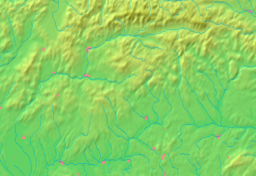Sliač
| Sliač | ||
| Town | ||
|
||
| Country | Slovakia | |
|---|---|---|
| Region | Banská Bystrica | |
| District | Zvolen | |
| River | Hron | |
| Elevation | 305 m (1,001 ft) | |
| Coordinates | 48°36′43″N 19°08′37″E / 48.61194°N 19.14361°ECoordinates: 48°36′43″N 19°08′37″E / 48.61194°N 19.14361°E | |
| Area | 39.83 km2 (15.38 sq mi) | |
| Population | 4,812 (2005-12-31) | |
| Density | 121/km2 (313/sq mi) | |
| First mentioned | 1244 | |
| Postal code | 96231 | |
| Area code | +421-45 | |
| Car plate | ZV | |
| Statistics: MOŠ/MIS | ||
| Website: www.sliac.sk | ||
Sliač is a small spa town located in central Slovakia, on the Hron river, between Banská Bystrica and Zvolen. The town is known for its healing hot springs and for an airport which has been used for military as well as civil purposes. Sliač has a population of less than 5,000.
The town arose through a merger of two villages, Hájniky and Rybáre, in 1959 and was given the name "Sliač". However, both original settlements are much older. The Gothic church in Hájniky was mentioned for the first time in 1263 (when the territory belonged to the Kingdom of Hungary) and there is archaeological evidence of Slavic settlers living in the area since the 6th century. Some evidence also indicates that the history of the settlement stretches to 2000 B.C. The airport, formerly known as Letisko Tri Duby ("The Three-Oaks Airport") due to the name of the area it was located in, played the key strategic role during the Slovak National Uprising.
In 2005, Sliač had a population of 4,812. According to the 2001 census, 96.1% of inhabitants were Slovaks and 2.3% Czechs. The religious make-up was 46.1% Roman Catholics, 26.7% people with no religious affiliation, and 22.1% Lutherans.
...
Wikipedia






